What Are The Benefits Of Energy Efficient Windows?
If you’re in the market for new windows, you may wonder if energy-efficient windows are worth the investment. The…
If you’re in the market for new windows, you may wonder if energy-efficient windows are worth the investment.
The answer is a resounding “yes!” There are many benefits of installing energy-efficient windows in your home.
In this blog post, we will discuss some of the top benefits of making this upgrade.
Benefits Of Energy Efficient Windows
Windows are one of the essential features of a home. They let in natural light, provide ventilation, and can even help to regulate the temperature inside. However, not all windows are created equal.
Get Your Hand on Your Eco-Friendly Living Starter Guide!
Energy-efficient windows are designed to provide all of the same benefits as traditional single-pane windows while also saving money on energy costs. Here are five benefits of energy-efficient windows:
Lower Energy Bills:
Energy-efficient windows help to keep heat inside during the winter and outside during the summer. It can lead to lower energy bills year-round.
Increased Comfort:
Energy-efficient windows can make a home more comfortable by regulating the temperature inside. During extreme weather conditions, they can also help to reduce drafts.
Protection From The Elements:
Energy-efficient windows provide an extra layer of protection against wind, rain, and debris. It can help to keep your home safer during severe weather conditions.
Improved Acoustics:
Energy-efficient windows can also provide better noise reduction than old windows. It can create a quieter, more peaceful environment inside your home.
Enhanced Curb Appeal:
In addition to these practical benefits, energy-efficient windows also look great! They can add value to your home and improve its curb appeal.
Read More: 5 Best Eco-Friendly Alternatives To Latex Gloves
What Are Energy Efficient Windows?

Windows are a vital part of any home, providing natural light and ventilation while protecting against the elements. In recent years, there has been an increasing focus on energy efficiency, and windows play a vital role.
Energy-efficient windows are designed to reduce heat loss in the winter and heat gain in the summer. They typically have multiple layers of glass, with a “Low-E” coating that helps to reflect heat.
In addition, energy-efficient windows are often filled with argon gas, which further reduces heat transfer.
As a result, they can help keep homes more comfortable while reducing energy costs. When choosing new windows, it is essential to look for energy-star certified windows products and the National Fenestration Rating Council (NFRC).
This independent organization provides ratings for various window performance metrics, including U-factor and Solar Heat Gain Coefficient (SHGC).
By selecting replacement windows with high ratings, homeowners can be sure they are getting a product that will provide actual energy savings.
Read More: Eco Friendly Vs Environment Friendly: The Difference
Choosing The Right Energy Efficient Window

When it comes to choosing energy-saving windows for your home, there are a few things you need to keep in mind.
First, you need to decide what type of window you want. There are three main types of new energy-efficient windows: double-paned windows, Low-E windows, and argon-filled windows.
Double-paned windows are the most energy-efficient, but they are also the most expensive. Low-e windows are less energy efficient, but they are less expensive. Argon-filled windows are somewhere in between.
Second, you need to decide what color you want your windows to be. White is the most energy-efficient color, but it is also the most visible outside your home. Black is the least energy-efficient color, but it is not as visible outside your home.
Third, you need to decide what style of window you want. There are four main styles of energy-efficient windows: casement windows, awning windows, hopper windows, and sliding windows.
Casement windows are the most energy-efficient but also the most expensive. Awning windows are less energy efficient, but they are less expensive. Hopper windows are somewhere in between.
Sliding windows are the least energy efficient but the least expensive. Once you have considered all of these factors, you should be able to choose the right energy star efficient windows for your home.
How Much Do Energy Efficient Windows Cost?
Energy-efficient windows can cost anywhere from a few hundred to a few thousand dollars, depending on the size and type of window.
The most common type of energy-efficient window is the double-pane window, which has two layers of glass and a layer of gas. Depending on the size and style, these windows can cost between $350 and $850 per window.
Triple-pane windows are even more energy efficient but come with a higher price tag, typically costing between $800 and $1,200 per window.
However, if you’re looking for the most energy-efficient option, you’ll want to consider solar windows. Solar windows are made with a unique film that helps to reflect sunlight and keep heat out of your home.
They can cost between $1,000 and $4,000 per window, making them the most expensive option on the market.
But solar windows may be worth the investment if you live in an area with high temperatures and lots of sunlight.
New Window Installations Tips
When it comes to energy-efficient windows, installation is critical. While many window companies will tell you that their windows are “plug and play,” the reality is that a poor installation can negate the energy savings of even the most efficient window.
Here are a few tips to ensure that your energy-efficient windows are correctly installed:
Check The Fit:
Before installing your energy-efficient windows, ensure they fit snugly in the opening. If there are any gaps, use caulk or foam sealant to fill them in.
Install Weather-Stripping:
To keep cold air from seeping through your windows, install weather-stripping around the perimeter of vinyl window frames.
Use Shims:
Shims are thin strips of wood or plastic that you can use to level out the window in its opening. It is essential because an uneven window can cause drafts and heat loss.
By following these simple tips, you can be sure that your modern windows are installed correctly and will perform as advertised.
Faqs About Energy Efficient Windows
Energy-efficient windows are a great way to save energy and money on your energy bills and help reduce your carbon footprint.
But with so many different types and brands of energy-efficient windows on the market, it can be challenging to know which one is right for you.
Here are some of the most frequently asked questions about energy-efficient windows to help you make the best choice for your home:
Difference Between An Energy Efficient Window And A Regular Window?
Regular windows are not designed to prevent energy transfer, while energy-efficient windows are designed to minimize heat loss.
Energy-efficient windows are usually made with double or triple-glazed glass, which helps to create a barrier between the inside and outside of your home.
In addition, energy star windows often have Low-E coatings, which reflect heat into your home.
How Much Will I Save By Switching To Energy Efficient Windows?
The money you save by switching to energy-efficient windows depends on several factors, including the type of window, the size of your home, and the climate you live in.
However, on average, you can expect to save between 10-15% on your energy bills.
Are There Any Government Incentives Available?
Yes! Numerous government programs offer tax credits and rebates for energy efficiency upgrades, including energy-efficient windows.
How Long Do Energy Efficient Windows Last?
The most energy-efficient windows will last for 20 years or more with proper care and maintenance.
Final Thoughts
Overall, energy-efficient windows are a great way to save money on your energy bills and help reduce your carbon footprint. While they may cost more upfront, the long-term benefits of energy-efficient windows make them a wise investment for any homeowner.
Solar windows may be worth the investment if you live in an area with high temperatures and lots of sunlight.
Keep Reading:
Eco-Friendly Alternative To Air Conditioning: Top 11






